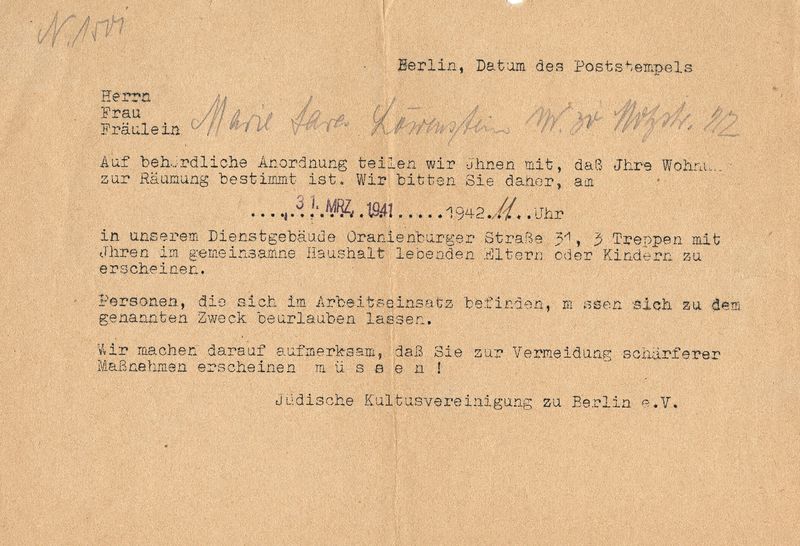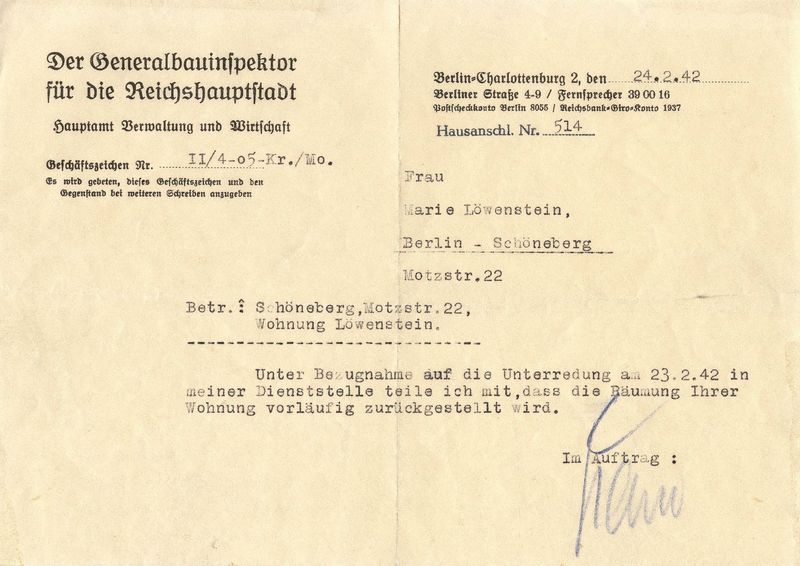The Loewenstein Family: A Story of Survival
Thousands of Jews had already been killed when the infamous Wannsee conference took place in January of 1942. It was then that fifteen top Nazis met to finalize plans for the systematic annihilation of the Jews with industrial efficiency.
Dr. Max Loewenstein was still in the Wittenauer Sanatorium when the major roundup of Berlin’s Jews began. Several thousand men, women, and children (including Max’s brother Georg and sister-in-law Alice) had been sent to the Łódź and Riga Ghettos, or taken to concentration camps. Construction of the death camps was almost complete, making it possible to murder many thousands each day. An incredibly evil and efficient method was now used to gather up Berlin’s Jews for transportation to the East.
After Kristallnacht, the Nazis had taken over Jewish cultural organizations, forcing them to do their “dirty” work. They now used these organizations' staff and letterhead to send Nazi orders to Berlin’s Jews. In 1942, the Nazis used the Jüdische Kultusvereinigung zu Berlin e.V., one such organization, to send “Eviction Notices” to every Jewish household in Berlin, including the Loewensteins.
Everyone in the household, without exception, was ordered to appear at a designated time and location. An estimated 60,000 Jews who obeyed the order to appear were packed in cattle cars under the most inhumane conditions and sent to the death camps to be gassed. This “notice” was, in effect, a death warrant. This document is extremely rare – almost everyone who received it was sent to the Auschwitz death camp. Those who dared to ignore it would not have carried this order with them, since that alone would have meant instant death if caught.
This scrap of paper shows the methodical manner in which the Nazi bureaucracy carried out their plan to kill millions of innocent people.
When Maria received the order, she pretended not to know where Max was, refused to vacate the apartment, and appealed the order to the local Building Department. She produced transcripts of her parents’ marriage certificate, her birth and baptismal records to prove her Aryan heritage and receipts and bills to prove residence at her address. The order was temporarily rescinded, most likely the only time that happened.
Max was discharged from the Wittenauer Sanatorium in April 1942. Thanks to Maria’s courage and quick thinking Max had escaped deportation.
Max had to report to the police after leaving the Wittenauer Sanatorium, and both he and Maria were assigned to work at forced labor. Maria had to work a twelve-hour night shift sewing military uniforms, and Max was made to work twelve hours each day, sorting shoes and other personal possessions that came back from the death camps by freight car loads.
Karin continued to work for an insurance company during the war until air raids and the Russians advances made that impossible.

